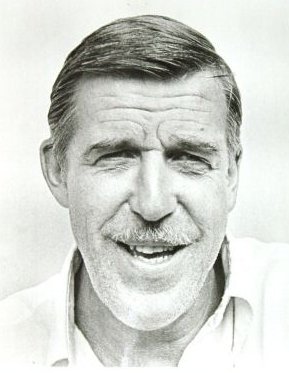Fred Gwynne (Frederick Hubbard Gwynne)

Fred Gwynne
Fred Gwynne is best remembered for his role of Herman on the television comedy series, “The Munsters” (1964-1966) and for his role of Officer Francis Muldoon in the television comedy series, “Car 54, Where are You?” (1961-1963). He was also a noted author and illustrator of ten children’s books, including “The King Who Rained” (1970), “A Chocolate Moose for Dinner” (1976), and “A Little Pigeon Toad” (1988). Born Frederick Hubbard Gwynne in New York City to Frederick Walker Gwynne, a stockbroker, and to Dorothy Ficken Gwynne, a cartoonist, he attended the exclusive prep school Groton, where he appeared in the student production of Shakespeare’s “Henry V.” During World War II, he joined the US Navy, and served as a radioman aboard a subchaser, a small combat ship specially designed to destroy enemy submarines. Leaving the Navy at the end of the war, he went to Harvard University, where he majored in English, worked on the staff of the “Harvard Crimson” student newspaper, and was a member of the distinguished Harvard Hasty Pudding Club, where he further refined his acting skills, graduating in 1951. After a stint of stage acting in Cambridge, Massachusetts, he went to New York City, where he worked initially as a musician, copywriter, and book illustrator. His first book, “The Best in Show” was published in 1958. In February 1952, he made his debut in the Broadway play “Mrs. McThing,” where he acted with future notable actors Helen Hayes, Ernest Borgnine, Irwin Corey, and Brandon DeWilde. He would make his movie debut as an unbilled thug in “On the Waterfront” (1954), actor Marlon Brando’s showcase film. In 1955, he made a guest appearance on producer Nat Hiken’s “The Phil Silvers Show” and his character was so popular that he returned for several guest appearances. This led to additional roles, and in 1961, producer Nat Hiken cast him in one of the lead roles in “Car 54, Where are You?” Even though the show only lasted two seasons, it became a cult hit in the rerun circuit. As a result, he was selected to play his most remembered role, that of a Frankenstein monster-like character, Herman, in “The Munsters” (1964-1966), which also lasted only two seasons, but like “Car 54” it also achieved cult status during reruns. Following his work in “The Musters” Gwynne would then work over the years in numerous television specials, movies, and again on the stage. Because he had become somewhat typecast as Herman Munster in the minds of producers, he tended to refuse any roles that came close to the Herman Munster model. He would continue to advance his acting career, including his ability to sing, in a television episode of “The Littlest Angel” (1969), part of the Hallmark Hall of Fame series. He made a rememberable comedy performance in “My Cousin Vinny” (1992) as the southern judge who spars against actor Joe Pesci, playing a New York City lawyer. Gwynne also sang professionally, painted, sculpted, and wrote and illustrated ten children’s books for the publishing house of Simon and Schuster. Gwynne was married twice, first to Jean “Foxy” Reynard (1951 to 1980), with whom he had four children, and then to Deborah Gwynne (1988 to his death in 1993). Gwynne died in his Taneytown, Maryland farm home after a battle with cancer of the pancreas. (bio by: Kit and Morgan Benson) Family links: Parents: Frederick Walker Gwynne (1884 – 1935) Dorothy Ficken Gwynne (1886 – 1978) Children: Dylan Gwynne (1962 – 1963)* Siblings: Dorothy F. Gwynne (____ – 1919)* Bowers Gwynne (1917 – 1917)* Fred Gwynne (1926 – 1993) *Calculated relationshipCause of death: Pancreatic cancer
Born
- July, 10, 1926
- New York City, New York
Died
- July, 02, 1993
- Taneytown, Maryland
Cause of Death
- Pancreatic cancer
Cemetery
- Sandy Mount United Methodist Church Cemetery
- Finksburg, Maryland


